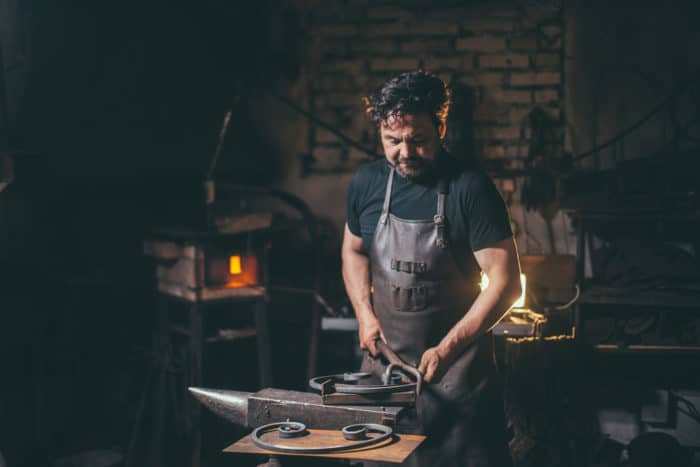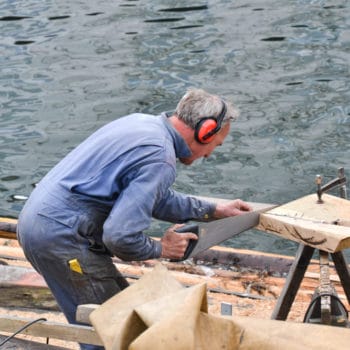Why We Love It
-
$36,910Potential Avg. Salary
-
-21.3%Job Growth Rate
-
Creativity FocusedCareer Attribute
-
Flexible HoursCareer Attribute
A blacksmith or a metal smith is an expert on creating and repairing various objects made of metals like iron and steel, through forging and shaping the metal via tools like chisels, hammers, tongs, etc.
Recommended Schools
What is a Blacksmith?
Duties
Here are the duties of a blacksmith:
- Forges, shapes and repairs items made of different metals like hooks, rods, chisels, wrenches, tongs, chains, equipment and machine components in a blacksmith’s furnace.
- Uses a wide range of tools like hand tools, air chisels, trip hammers, drills, brackets and clamps to weld and temper metal articles.
- Maintain detailed records of all financial transactions and the type of repair or fabrication of tools or machine parts.
- Calculate an approximation of the tensile strength and fracture as well as the strain on a material for any cold repair method.
- Coordinate with companies or private clients on specific job requirements.
Day In The Life
A blacksmith spends most of his day near a forge or furnace, heating, welding and shaping different metals such as brass, steel, iron, bronze and copper, for assigned projects. You will be utilising power tools and hand tools to get the work done efficiently. Once the basic shape of the object is created, you will use small chisels, tongs and hammers to finish the product.
To harden this item, it is placed in the forge at high temperatures between 500 to 1300 degrees Fahrenheit, then soaking it in cold water to bring it back to room temperature. The next step is called tempering, when the item is again placed in a forge and heated to a lower temperature in order to make it less brittle. The final cooling of the metal item is done at room temperature. In addition to making new products, you may also transform or repair existing metal products – this takes less time and effort.
Work Schedule
Blacksmiths work up to 35-40 hours every week from Monday to Friday with occasional overtime. The work environment is physically demanding, involving the heavy lifting of metal objects and working in noisy conditions. You may also have to wear protective clothing such as safety eye wear, ear defenders, aprons, and boots. The setting may vary between large engineering or mining workshops to small-scale sheds. If self-employed or employed by a small enterprise, the hours usually depend on your workload.
Growth Of The Job
As a blacksmith, you can find diverse opportunities for growth in sectors like building and construction, agriculture, manufacturing and wholesale trade. Enough experience will lead you to supervisory roles, instructing students as a trainer, or establishing an independent business. New positions and high turnover from existing employees leaving are expected to provide more openings for aspiring blacksmiths.
Some blacksmiths transition into working as a farrier – a role that factories cannot replace – which involves crafting and fitting horseshoes. With sufficient experience in the field, you can also be an ornamental blacksmith in the arts and crafts industry, creating tailored products for customers like metal tools, iron furniture, wall decor, ornaments and artwork.
Typical Employers
You can expect to be hired by various institutions like museums, galleries, architectural firms, civil war re-enactments and fairs. Businesses such as metal fabrication and manufacturing are also on the lookout for qualified blacksmiths. Ornamental blacksmiths often lend their expertise to decorative items at small retain shops, for sculptures, crafts, chandeliers, fireplace pokers and weather vanes. Vocational schools and certification courses on metalsmithing often hire blacksmiths to instruct aspiring students on the subject area.
Recommended Schools
How To Become a Blacksmith
To become a blacksmith, you must obtain a basic high school diploma or its equivalent. You should also have a driver’s license and maintain a clean driving record as some part of the role involves traveling to the job site. In recent times, there are some colleges that allow you to complete a bachelor’s or master’s degree in metalsmithing or blacksmithing. In addition, you can look into vocational programs that offer training and introductory coursework on the history of blacksmithing, working with hand and power tools for the trade, terminology used in the industry, etc.
Important skills to succeed in this trade include an inherent talent and familiarity with metalwork, such as forging and understanding how to shape and repair metal objects. Knowledge of which metals are forged at certain temperatures and how to use chisels and hammers to work the metal is also a distinct advantage. Such deep understanding can be gained at an early stage by completing an apprenticeship with an experienced professional.
Blacksmith Salary Data
We’ve provided you the following to learn more about this career. The salary and growth data on this page comes from recently published Bureau of Labor Statistics data while the recommendations and editorial content are based on our research.
National Anual Salary
Low Range
$27,370Average
$36,910High Range
$55,450National Hourly Wage
Low Range
$13/hrAverage
$18/hrHigh Range
$27/hrHow do Blacksmith salaries stack up to other jobs across the country? Based on the latest jobs data nationwide, Blacksmith's can make an average annual salary of $36,910, or $18 per hour. This makes it an Above Average Salary. On the lower end, they can make $27,370 or $13 per hour, perhaps when just starting out or based on the state you live in.
Salary Rankings And Facts
#590 Nationally for All Careers
Highest Education Among Blacksmiths
- 0% Doctorate
- 0.1% Masters
- 3.4% Bachelors
- 2.1% Associates
- 21% College
- 60.7% High School
- 12.7% Less than High School
Job Growth Projections and Forecast
2014 Total Jobs
21,6002024 Est. Jobs
17,000Job Growth Rate
-21.3%Est. New Jobs
-4,600How does Blacksmith job growth stack up to other jobs across the country? By 2024, there will be a change of -4,600 jobs for a total of 17,000 people employed in the career nationwide. This is a -21.3% change in growth over the next ten years, giving the career a growth rate nationwide of Below Average.
Growth Rankings And Facts
#794 Nationally for All Careers
What Companies Employ The Most Blacksmiths
| Industry | Current Jobs | New Jobs Needed | % Increase |
|---|---|---|---|
| Forging and stamping | 5,000 | -1,000 | -1% |
| Plastics product manufacturing | 3,400 | -900 | -1% |
| Motor vehicle parts manufacturing | 2,500 | -600 | -1% |










